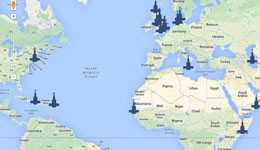The World’s Largest Plastic Navigation Buoy
Corilla Marine, manufacturers of the world’s first plastic navigation buoy, has also created the world’s largest plastic navigation buoy which has replaced the original Tees Fairway buoy, marking the main navigable channel to Tees and Hartlepool.
Having already supplied more than 70 buoys for PD Ports, owners and operators of Teesport – the second largest container port in the north of the England , used by more than 5,000 vessels each year – South Wales-based Corilla Marine was asked to put forward a design to replace the Tees Fairway buoy which disappeared, assumed sunk with the world’s largest plastic buoy.
The new polyethylene buoy, the largest in the world, would not only have to be a landmark in both size and ingenuity, but would have to operate in particularly demanding conditions of Beaufort 10+ and swells in excess of 10 metres.
After several months on the drawing board, a design was agreed which resulted in the replacement buoy being an overall height of 12 metres, with a diameter of 4.5 metres, a focal plane of 8.2 metres and weighing in at around eight tonnes.
The design featured a custom made steel core which allowed Corilla to use floatation collars from existing buoy designs, thus reducing the overall cost. The core, mast and tail tube were made in Glasgow and shipped directly to the port for assembly. Had the buoy been assembled elsewhere and transported to Teesport, its sheer size would have required a police escort and transportation costs would have escalated.
Part of the manufacturing process included the need to paint sections of the giant plastic buoy – a specialised operation to ensure that the coating remains flexible yet durable.
“The modularity of our eventual design for the Tees Fairway Buoy is true of all Corilla buoys – offering cost savings by using stock components and allowing the finished structure to be bolted together despite its size,” says Tom Fleming, Chairman of the Corilla Group.
Corilla’s innovative, rotationally moulded plastic navigation buoys have made their steel predecessors obsolete. Suited to inner harbour, river and coastal applications, their modular design ensures a durable, lightweight and rust-free alternative. Corilla’s buoys can remain at sea far longer than their steel counterparts, making them operationally superior.
Corilla’s products are not only used extensively in the UK – with customers including the Ministry of Defence, the Royal Navy and Trinity House – but also throughout Europe and as far afield as Nigeria, Somalia, the Middle East and in the Caribbean.
Based in Middlesbrough, PD Ports operate Teesport, together with Felixstowe and the Humber Estuary. Employing more than 1250 staff, the company also operates the short sea ports of Howden, Keadby and Medina Wharf on the Isle of Wight. Hull Container Terminal is also managed by PD Ports and the company has the largest stevedore and warehousing company within the Port of Immingham.

 Where are our buoys?
Where are our buoys?